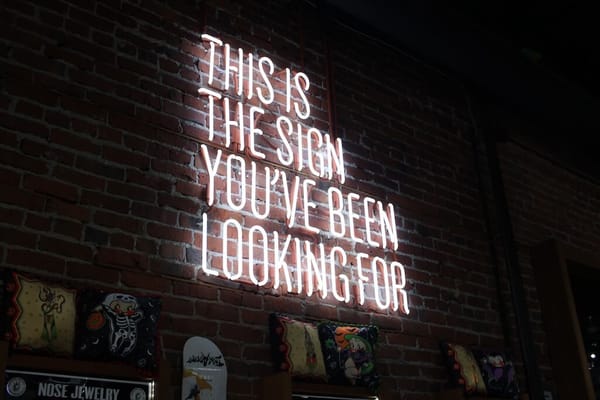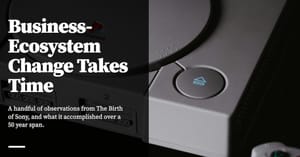It’s a little funny that I’ve not talked about personal brand before, given Commonplace’s focus on building career moats. A reasonable reader might ask: “well, isn’t personal brand a strong type of a moat?”
The answer to that is yes, it certainly is. But we must be careful about personal brands — the same way that we must be careful whenever we deal with career prestige, or status; personal brands are useful, but they hook into powerful psychological factors that distort their real value.
Let’s back up a little.
Longtime readers would know that my conception of a ‘career moat’ comes from Warren Buffett’s notion of an ‘economic moat’ — a term he uses to describe sustainable competitive advantages in business. Buffett favours companies with brands because a good brand is a powerful way to build a sustainable advantage.
But there’s a caveat here: brands alone don’t make a moat. The ownership of a powerful brand must lead to sustained pricing power in order to be valuable.
In other words, a company may have a great brand, but if it is unable to raise prices against its competitors … then the brand doesn’t count for very much.
As it is for businesses, so it is for careers.
Pricing Power in Careers
I think that if you’re building a personal brand for your career, then you should evaluate it based on the career benefits that it gives you.
(There are alternative reasons to build a personal brand, of course, such as to attract like-minded people on social media, or to expand your exposure to new friends and to new ideas — but I’m not talking about that here; this is a career blog, after all!)
So what is a personal brand?
Let’s first talk about brands in general. People often confuse branding and brands for design, or marketing. Brands are constructed using design, and established using marketing, but they aren’t either things. The best definition I’ve seen on the topic is by businessman Brent Beshore, who argues:
“Brand is the distribution of likely outcomes that you can expect from any company or person.”
Morgan Housel writes:
Brand wasn’t about having the highest quality. It wasn’t even about building trust. “You don’t trust the Coca-Cola brand,” Beshore said. “You know what to expect from them.” Knowing what to expect. That’s the essence of a brand.
A personal brand is therefore a set of expectations around your skills, your behaviour, your values and your worldview.
It’s important to remember that consistency is the key component of a strong brand, not excellence. As Housel notes in his piece, it’s entirely possible to build a great brand on a subpar experience — take McDonald burgers, for instance, which are consistent regardless of whether you eat them in Vienna or Vietnam.

A strong business brand is one that delivers a consistent set of outcomes for the customer. A good business brand is one that allows the business to exercise pricing power.
In the context of a career, a strong personal brand is a repetitively consistent portrayal of your personality, your conduct, your skills, and your worldview. A good personal brand translates to jobs and opportunities that you might not otherwise have access to. In theory, a famous programmer commands a salary premium that a non-famous programmer does not. A marketer that’s known for good work gets hired at a higher rate. A solopreneur with an audience is able to launch products to that audience. And so on — an infinite number of examples abound.
I bring this up because it is entirely possible to build a brand that gives you little career benefit. If you’re reading this, it is likely that you are a career-oriented person, and you know me as the ‘career-moats’ guy. But my writing on Commonplace has little to no bearing to my actual career moat — that is, my ability to grow and manage engineering teams in uncomfortable South East Asian countries. My reputation around that moat is built through personal referrals in Singapore’s startup community.
Do Impressive Things And Tell People About It
Personal brands have existed for as long as careers have existed. In the past, we used simpler words like ‘reputation’ … as in “wow Sally seems to be developing quite the reputation as a turnaround artist, hasn’t she!?” The fact that we use phrases like ‘personal brand’ today is a reflection of our media climate. The Internet has turned us all into publishers and broadcasters, and our language has adapted accordingly.
This has several implications, ones that I’m uncomfortable with.
There’s an old adage about careers that goes “to have a great career, go do impressive things, then tell people about it.” Presumably, the personal brand bit falls into the latter half of the sentence, the ‘tell people about it’ half. This is sensible advice.
My misgivings come from the observation that it is possible to hack personal brands today in a way that was impossible for reputations a few years ago. A good many people are able to build a following if they are sufficiently good at writing, marketing, or videography. These followings do lead to increased career opportunities. But they don’t often last.
You see this the most clearly with venture capitalists. Brent Beshore observes that the typical career path in venture capital today isn’t to build out a fund and to use its returns to justify raising future funds from limited partners. Investing is a difficult activity, and VC returns are generally terrible — the best firms have access to the best deals, leaving the scraps for everyone else to fight over. So instead of banking on good returns, the typical VC career path is to build up a personal brand on social media, and use this asset to soft-land into some other role in the (likely) event that their fund fails.
The implication here is that the many thought leader VCs you see on social media today will go away in a decade or so when their funds close … or whenever it is that capital markets force them to change. The investors that stick around will be those who have mastered the extremely difficult art of investing in early-stage companies.
I remember hearing Beshore’s argument about brands and VCs, and then working through the second-order implications of his reply. First: perhaps building personal brands in the way that VCs do (marketing, self-promotion, social media) is a good idea in the short term — say, if you want to parlay it into one or two career moves. But this then begs the question: why bother building a brand if it lasts only a decade? Most careers are four decades long. The peak of a typical career occurs in one’s 50s and 60s. A brand that lasts 10 years, built early in one’s career, seems like a waste of time in the grand scheme of things.
The really difficult bit of ‘do impressive things and then tell people about it’ is the first part: the ‘do impressive things’ part. Don’t let anyone tell you otherwise: it is incredibly difficult to build a set of rare and valuable skills. Chess players practice for a decade on average to reach grandmaster status; Chinese businessmen often take two to find their feet and reap the fruits of their businesses. There doesn't seem to be an easy way around it.
It is for this reason that I am suspicious of people who have huge personal brands in their 20s and 30s, without the rare and valuable skills needed to justify them. My reasoning for this is that I look at people in their 40s and 50s today and find that very few of them built their brands in their 30s; nearly all of them spent that time building a rare and valuable combination of skills.
My primary takeaway from these people is that it is easier to build a personal brand by being impressive in the first place. This may take a long while, as is the case with most things in one's career. But reputation flows downhill from impressiveness. And brand building is relatively easy when compared to the grind of becoming impressive in the first place.
You may argue that social media didn't exist in their generation, and that this has changed today. Your argument may well be true.
But the other perspective here is that perhaps reputation matters more than media-centric brand-building — and for many industries, such reputation networks remain unchanged. You almost can’t help but build networks of fellow operators as you become better at some valuable skill; if you work in such industries, it’s probably better to focus on such networks than it is to build up your following on Twitter.
Closing Thoughts
If I were to summarise the ideas in this piece, I’d argue the following:
- Like in business, personal brands (built for careers!) should be evaluated on pricing power. If your industry is one in which a stronger personal brand leads to materially better career outcomes, then building a brand is worth it, and you should go for it. Otherwise, it’s probably a distraction from the difficult task of getting good at something.
- Even if your industry is one in which a stronger personal brand matters, it’s worth it to periodically evaluate the relationship between the aggregation of attention you’ve gathered around yourself and the career outcomes that you want to achieve. Personal brand building is alluring because it appeals to your ego. It is terribly easy for this psychological effect to distort your evaluation of its value.
- Careers last a full four decades, on average. I think it’s worth it to evaluate people along this timescale. If you know people with huge personal brands today, ask yourself: are their personal brands going to last a decade or more? And are they staking their reputation on market dynamics that will change beyond a decade? The people with the longest lasting and best performing personal brands — investors like Warren Buffett and Howard Marks; chefs like Wolfgang Puck, Alice Waters, Michael Romano and Danny Meyer — took a long time to build their skills, and usually staked their reputations on something that is unchanging and universally valuable (equity investing, distressed debt, and restauranting, in that order).
The most important takeaway is probably the last one, above. Much writing on personal brands today focus on tactical approaches to bend social media to one’s benefit. But I think it’s valuable to look at the bigger picture here. Most careers last four decades, not four years.
We should act like this is the case.
Originally published , last updated .





